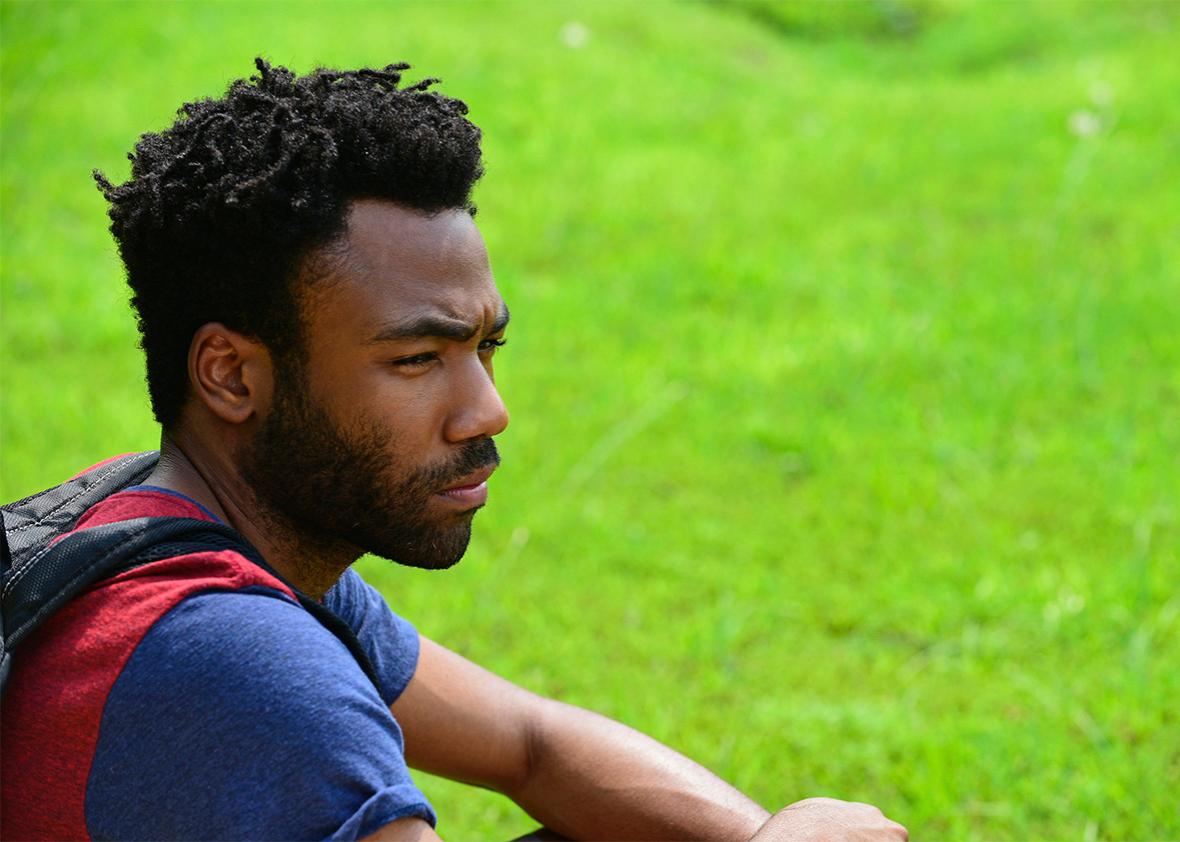About eight years ago, I saw Donald Glover do a short stand-up set at a weekly comedy showcase when he was still a precocious writer on 30 Rock. I am going to manhandle the bit, which killed, but it was about how often and easily little kids throw up, youth being one vomit after another. It was charming, full of physical comedy and character work. More than any of the lines, I remember Glover pretending to be a child, who midsentence, convulses and vomits, unperturbed. When Glover got cast on Community as the big-hearted jock Troy Barnes, it made sense: Glover has the kind of warm charisma that makes him naturally sympathetic in any role.
I thought of this watching Atlanta, which started Tuesday night, because in it, Glover treats his native charisma like a hair shirt; he can’t shed it soon enough. Atlanta, which Glover stars in and created, is ambitious and atmospheric and adolescent, skeptical of seemingly easy pleasures—laughter, warmth— that are actually hard to deliver.* Glover stars as the struggling Earn Marks, who a few years ago tried and failed to make it in the music business, and is now lost and broke. He has a young daughter with his on-again-off-again girlfriend, Van (Zazie Beetz), and he crashes at her house, even though she’s dating other people. His parents watch his daughter all the time, but they are fed up with Earn. Working for paltry commissions selling cellphone plans at the Atlanta airport, he sees a new video from a rapper named Paper Boi (Brian Tyree Henry, very good) and recognizes him: Paper Boi is Earn’s cousin Alfred. He leaves the airport, and smoking weed on a dilapidated couch behind Paper Boi’s house, pitches himself as Paper Boi’s manager.
Atlanta is nominally set in the music business, but through four episodes, the plot, such as it is, circles around Earn’s poverty. Earn can’t or won’t try to get a better job than selling cellphones, for reasons that have to do with his dreams of being a rapper, and so he is destitute. The first episode is framed by a shooting that lands Earn in processing at jail, where he spends the entire second episode because he can’t make bail. He wants to woo Van by taking her out to dinner, but he accidentally goes to an expensive restaurant and spends the whole meal fuming about the cost and the upselling waitress. He spends the fourth episode with Darius (Lakeith Stanfield), Paper Boi’s spacey right-hand man, trying to turn the $190 he got from pawning his phone into more money, only for it to end in catastrophe.
If network shows are stereotypically overeager to give an audience a reason to care about a character, Atlanta plays it cool, giving very little information about how exactly Earn ended up as Earn. It assumes that we will find Glover sympathetic and alluring because Glover willfully suppresses these qualities, drawing us to him by giving nothing away. Earn is emotionally constipated, stopped up, bottled up. He can make for a more vexing protagonist even than the impossible Larry David or Hannah Horvath, because at least those maniacs do. Earn mostly watches. In the first episode, a white music business acquaintance uses the N-word in Earn’s presence. Earn is disgusted, but he lets it go, another thing that eats at him.
Atlanta is just the latest comedy to taste like drama. It has more laughs than many other prestige comedies, but fewer than most actual comedies, and the ones it has are prickly and strange, laced with menace and sadness, if also a real sense of place. As Earn sits with his sleeping daughter on a bus—he can’t afford a car—a man insists he try a peanut butter and jelly sandwich, a surreal and eerie moment. In a prison waiting room, a man recognizes his ex-girlfriend, who he doesn’t seem to know is transgender, until everyone else in the room points it out, cackling at him cruelly. A mentally unstable arrestee cracks everyone up, even while he drinks his own urine, until a cop lays him out with a baton. Paper Boi and Darius go to a drug deal with their suppliers, who use a sniper to shoot a screaming man as he runs through the woods.
Earn’s own behavior and personal relationships are similarly dour. Earn gets into a confrontation with a McDonald’s employee who won’t let him buy a kid’s meal, eventually settling for a water cup he fills with soda, a funny-ish riff brimming with anger. Earn and Van have a cute rapport—he teases her about her love of corny dudes; she reminds him he’s lucky she loves corny dudes; he teases that she’s an angry black woman stereotype; she laughs and says he should talk since he’s basically homeless and has a baby he can’t support; he lovingly sniffs her armpits—but their sweetness always curdles. A morning romp ends abruptly when Earn hesitates before saying he loves her. Van’s going out with someone else that night anyway. Earn’s father won’t let him in the house because he clogged the toilet last time he was there, a scatological joke that only underlines Earn’s solitude.
In the context of comedy, Earn seems like a milder iteration of the difficult (i.e. unlikable) protagonist, that cringe-worthy dervish of misbehavior. But as Earn simmers, watching, listening, holding things in (the poster art for Atlanta even has his mouth stopped up with a peach), walking down the street in the bubble of his headphones, he announces his kinship with the likes of Mr. Robot’s Elliot Alderson and The Girlfriend Experience’s Christine Reade, alienated and lonely young people, trying to find a way around the demands of capitalism, disgusted with what the world wants them to accept.
*Update, Sept. 7, 2016: This sentence has been updated to add that Donald Glover is the star and creator of Atlanta. (Return.)
